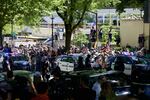A key witness to allegations of police misconduct during an Aug. 4 protest in downtown Portland is refusing to answer questions sent by investigators with the city's independent police oversight agency.
That's fine with Mary Hull Caballero, the elected head of the city auditor's office.
But Caballero takes exception, she said, to efforts to delegitimize the Independent Police Review, an independent city agency that investigates allegations of misconduct by Portland police officers.

Right-wing Patriot Prayer, Proud Boys and counter-protesters shout at one another from across a street in Downtown Portland.
Ericka Cruz Guevarra / OPB
Lawyers for Aaron Cantu, a protester who alleged a police flash-bang penetrated the back of his helmet, causing brain damage, first told the Willamette Week that they would not answer a list of 30 questions sent by IPR on Dec. 5 because the questions amounted to victim shaming and were not geared toward holding police accountable.
"I appreciate that they're representing their client, and they should," Caballero said. "But my problem with it is when they go beyond representing their client and smear the investigatory process that is set up to take complaints and investigate them."
Caballero said these statements also contribute to the notion that people should not file complaints with IPR. Caballero's frustration with mistrust in the process rubs against skepticism among community members dubious of the city's ability to hold itself — and namely, its police officers — accountable.
Problems with the investigation into the Aug. 4 protest form a case study of the city's larger problems with trust; that's despite having an independent civilian oversight agency like IPR, which was created in 2001 to serve as an independent alternative to other misconduct reporting processes.
Related: Portland Police Face Questions Of Impartiality After Radio Show Comments
Juan Chavez, one of two lawyers representing Cantu, said he responded to IPR's Dec. 5 letter saying he and his client could not in good faith answer IPR's questions. Chavez said he was convinced that by answering the questions, there would not be a true reckoning of what happened during the protest. Among the things IPR wanted to know was whether Cantu embedded the flash-bang into his own helmet, or if someone else embedded the flash-bang into his helmet.
"We're not afraid of the facts," Chavez said. "What we're worried about is what happens consistently in the city, which is the police manage to get past these controversies unscathed."
Chavez said he and his client didn't immediately oppose the idea of an IPR investigation. Things changed when IPR sent the list of questions on Dec. 5.
"Frankly we just don't want to participate in a process that we don't think is going to be fruitful in that kind of way," Chavez said.
Caballero said the system is byzantine, can be difficult to navigate, and can appear — from the outside — hard to understand as an independent city agency. She also says there can be frustration when a potential victim makes allegations that ultimately never amount to a finished investigation. As an example, she said, that can happen if witnesses don't answer questions from IPR.
"There can be some frustration from people if they feel like a case can't go forward," she said. "But I think having attorneys smear IPR isn't helping that at all."
While IPR conducts independent investigations and publishes its findings, Portland Police Chief Danielle Outlaw and City Council have the ultimate authority in disputed misconduct cases to determine whether or not officers will face disciplinary action.